
6(c)
1982
Act
Information
Official
the
under
Released
1982
FOOD PREPARATION WORKERS-Act
ANZSCO CODES
3513, 3514 AND 8
Information
511
Official
Chefs
the vs Cooks
under
Released
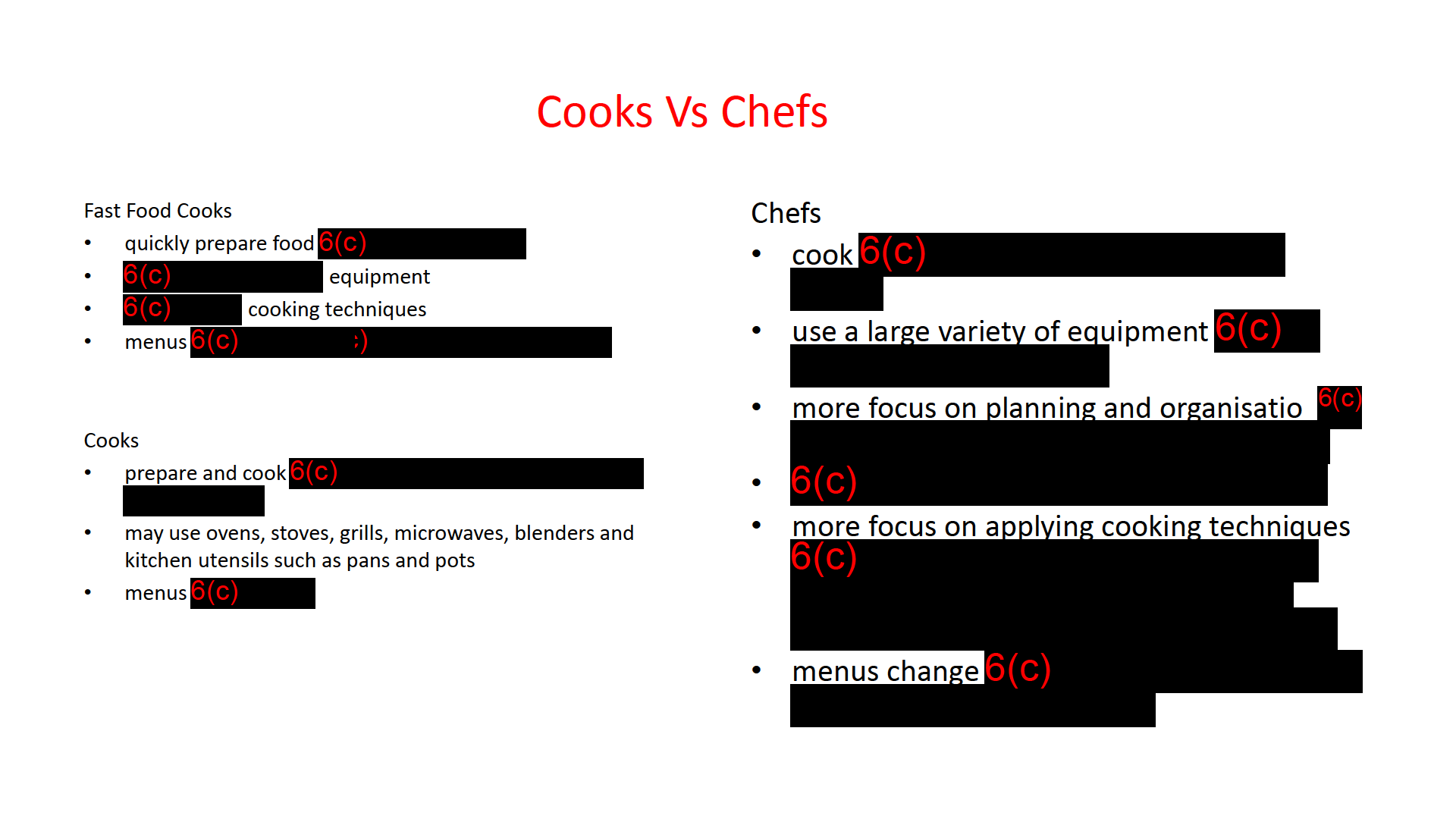
1982
Act
Information
Official
the
under
Released
Workplace Setting
Fast Food Cooks
• work at eateries and catering businesses such as malls, takeaway
stands and fast food franchises i.e. katsubi, sushi pac….
• may take orders behind a counter
• may work with similarly ranked cooking staff (senior and junior)
• may have kitchen hands reporting to them
• report to business owners and/or managers
under the Official Information Act 1982
• waiting services less common in the business
Released
Cooks
• work in cafes and smal food outlets who offer breakfast, brunch, lunch and dinner menus including
buffet where food is readily cooked ahead of any customer arriving
• kitchen is not sectioned (hot and cold food section)
• work alongside kitchen managers, and other cooks with similar expertise
• junior cooks report to senior cooks
• usual y have kitchen hands reporting to them
• report to the business/ franchise owner or manager
• the food outlet may have food service attendants
• cooks may help out waiters or work at a buffet stand
under the Official Information Act 1982
Released
Chefs
• work in restaurants (perhaps fine dining), and cafes
1982 that offer a la carte
menus
Act
• 6(c)
• each chef will be in charge of an area of the k
Information itchen for each service
depending on their ranking i.e. head chef may only do the pass and
plating during a service
Official
• restaurants serve guests and reser
the ve tables
• restaurants may offer separate space for private and corporate
functions with separate menus
under arranged with the guests
• Head and Sous Chefs may deal with customer complaints directly or in
conjunction with Restauran
Released t Managers
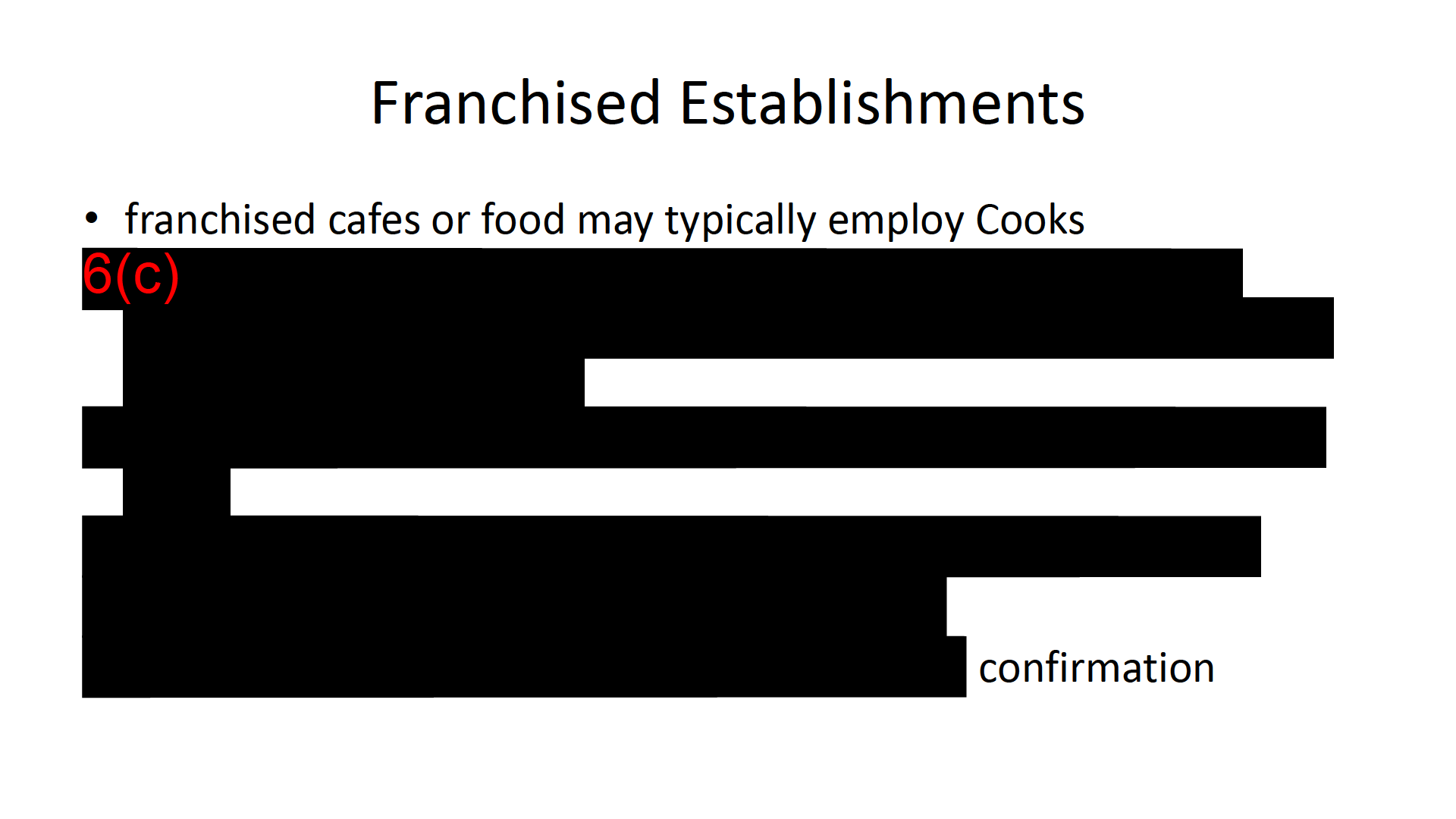
1982
Act
Information
Official
the
under
Released
Preparation
Fast food cooks
1982
•
prepare food 6(c)
Act
Cooks
• order 6(c)
Information
• prepare meals 6(c)
• typical y order 6(c)
Official
• menus do not change with seasonal availability
the
Chefs
• cook ingredients from scratch 6(c)
under
• research and create recipes
• meals require specialist cooking techniques
Released
• menus reflect seasonal availability of ingredients
Chef Progression
Commis Chef
•
entry level position
•
learns to apply knowledge gained through qualification or experience in practise
•
may rotate from station to station as they learn
1982
•
may start on larder station making desserts and some entrees
•
needs to adhere to health and safety standards
Act
Demi Chef
•
demonstrates some more skills
•
may be assigned to a particular production area
•
may rotate from station to station
•
may look after commis chef
Information
Chef de Partie
•
assigned to a particular section in the kitchen i.e Meat, Pans, Hot apps
Official
•
may help out other chefs
•
demonstrates cooking techniques to others particular to their section
the
•
explains and reinforce health, safety and hygiene standards
Sous Chef
under
•
assists Head Chef
•
assist with menu planning, staff recruitment and delegations.
•
progressed through hierarchy
•
wil possibly cook during service or wil just plate and send out food after inspection
•
may help out other chefs, demonstrate c
Released ooking techniques to others and explain and reinforce health, safety
and hygiene standards
Head Chef
• takes overall responsibility of the kitchen
• spends less time actually cooking but more time organising and
planning
• they may rely on the sous chef to ensure the cooking standards are
met during actual service
• may help out other chefs during prep
• demonstrates cooking techniques to others
• explains and reinforces health, safety and hygie
under the Official Information Act 1982 ne standards
• reports to the general manager, business or franchise owner and
liaises with restaurant man
Released ager
Expertise, Techniques and Equipment
Fast food cooks
1982
• not required to demonstrate cooking techniques
Act
• not required to cook according to recipes
• quickly learn how to use deep fryer, microwave, Panini machine, rice cookers or how to roll sushi
Information
Cooks
• may demonstrate simple cooking techniques such as boiling, frying and grilling
Official
• are not specialised in a particular kind of food as a chef might be
the
• buy pre-made sauces and pre-cut meats, seafood/fish and desserts
• may add further flavouring/seasoning
under
• work with some fresh ingredients for instance for garnishes and side dishes
• senior chefs may check the quality of the meals produced by others
• senior cooks may calculate food cost
Released ing but may only apply a flat percentage for labour costs
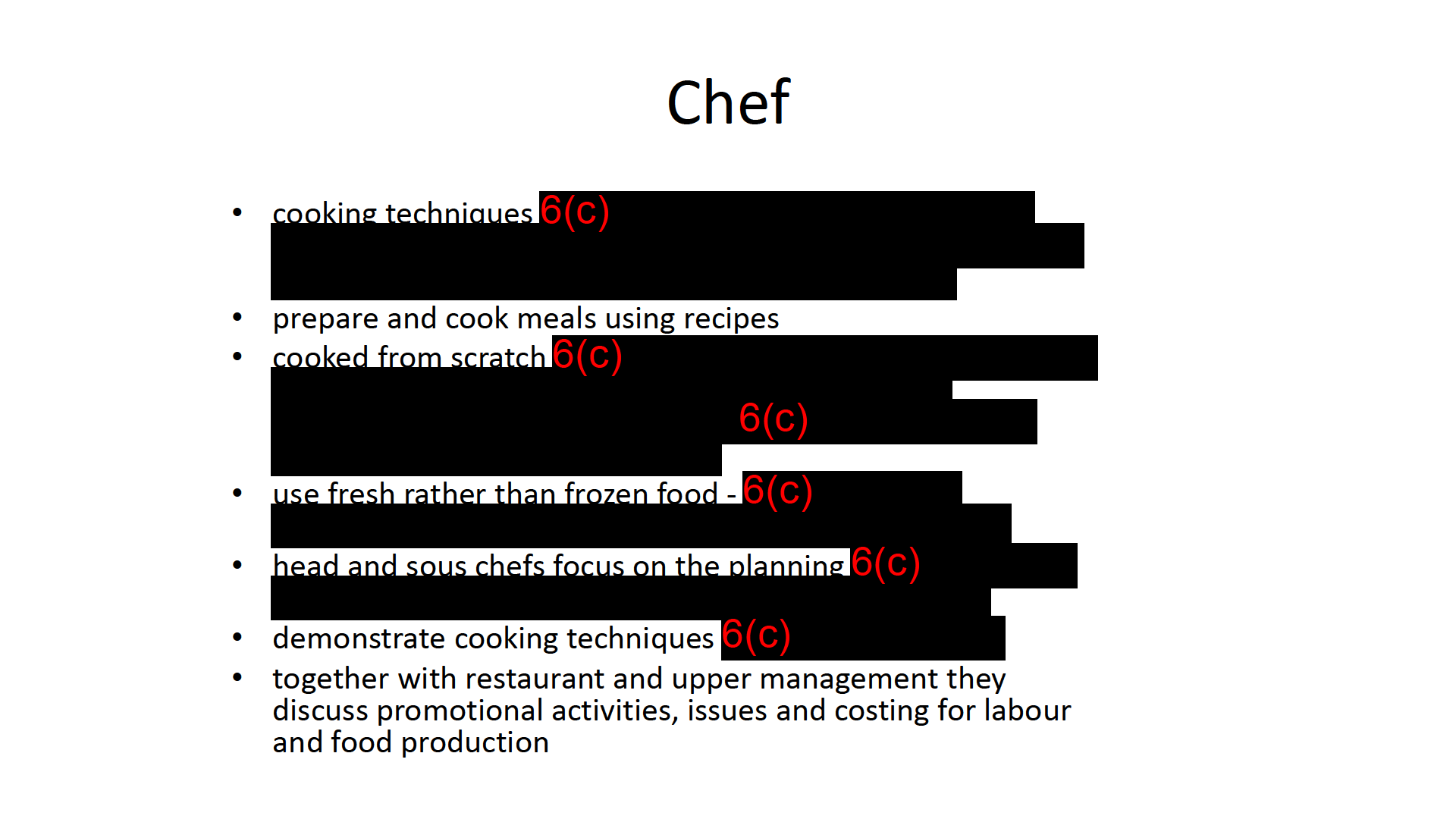
1982
Act
Information
Official
the
under
Released
Commis Chefs vs Cooks
• commis chefs are apprentice chefs and typical y assis
1982 t other chefs in the
preparation of food
Act
• typically start at the easiest section of the kitchen
• may have no particular specialisation yet (they are in the beginning of their
chef career)
Information
• apply simple cooking techniques to star
Official t with; however, given the scope
the work place offers, a Commis Che
the f is able to apply his or her learned
cooking techniques to other sections in the kitchen as s/he progresses
• commis chefs usual y have a clea
under r career progression through the kitchen
hierarchy
• cooks do not have same scope
Released and thus remain applying a limited range of
cooking techniques
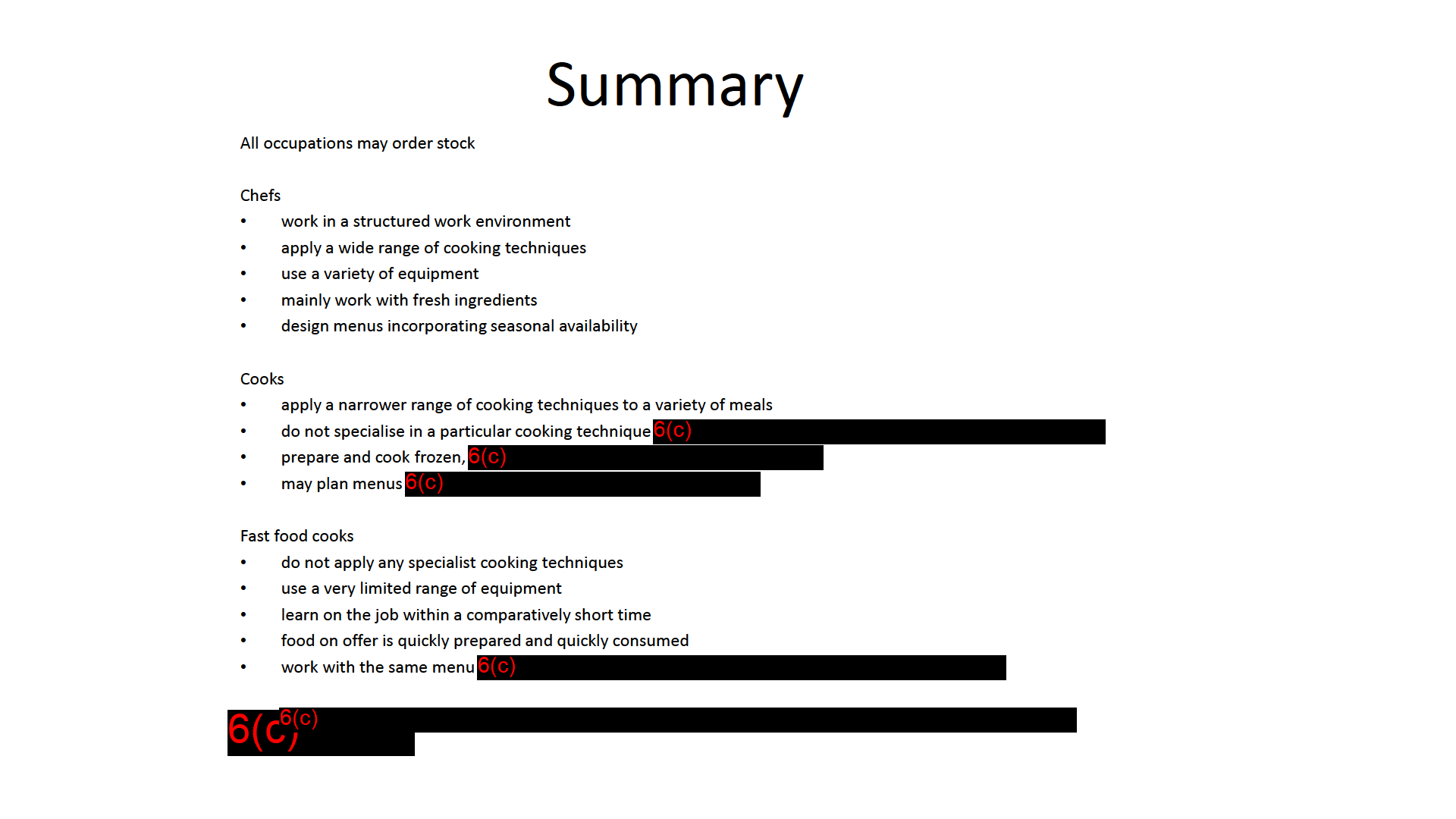
1982
Act
Information
Official
the
under
Released

1982
Act
Information
Official
the
under
Released
ANZSCO Code
85111-Fast food Cook
3514-Cook
351311-Chef
Expertise required
short period of on-the-job training At least three years of relevant experience
Relevant level 4 qualification or above, or At least three years
and/ or formal qualification
and a salary of $45K or more that may
of relevant experience
substitute for the formal qualifications at
level 4 or above
Overall responsi-bility prepare a restricted range of foods prepare, season and cook food in dining and
plan and organise the preparation and cooking of food in
in fast food establishments
catering establishments.
dining and catering establishments.
Duties
may plan menus
plans menus
may estimate food requirements
estimates food and labour costs
1982
- stock take and orders of fast food
orders food supplies
ingredients
Act
- may arrange delivery of prepared
food and beverages
operates cooking equipment such examines foodstuffs to ensure quality
monitors quality of dishes at all stages of preparation and
as gril s, microwaves and deep-fat
presentation
fryers
prepares food such as hamburgers, - prepares and cooks food
prep
Information
aresandcooksfood
pizzas, fish and chips
- seasons food during cooking
- regulates temperatures of ovens, gril s and
other cooking equipment
Official
washes, cuts, measures and mixes portions food, places it on plates, and adds
demonstrates techniques and advises on cooking procedures
foods for cooking
gravies, sauces and
the garnishes
takes and serves food and prepares food to meet special dietary
discusses food preparation issues with Managers, Dietitians
beverage orders, and receives requirements
and kitchen and waiting staff
payment from customers
under
cleans food preparation areas,
explains and enforces hygiene regulations
cooking surfaces and utensils
may train other kitchen staff and apprentices
may select and train staff
Released stores food in temperature controled
mayfreezeandpreservefoods
facilities
Specialisa-tions
-
-
Head or Executive Chef (also Chef de Cuisine)
Sous or Second Chef
Chef
de
Partie
Demi Chef
Commis Chef
What to look for in a Chef
–
planning menus
1982
6(c)
Act
–
estimating food and labour costs
6(c)
Information
–
and ordering food supplies
6(c)
Official
the
-
monitoring quality of dishes at al stages of preparation and presentation
6(c)
under
Released
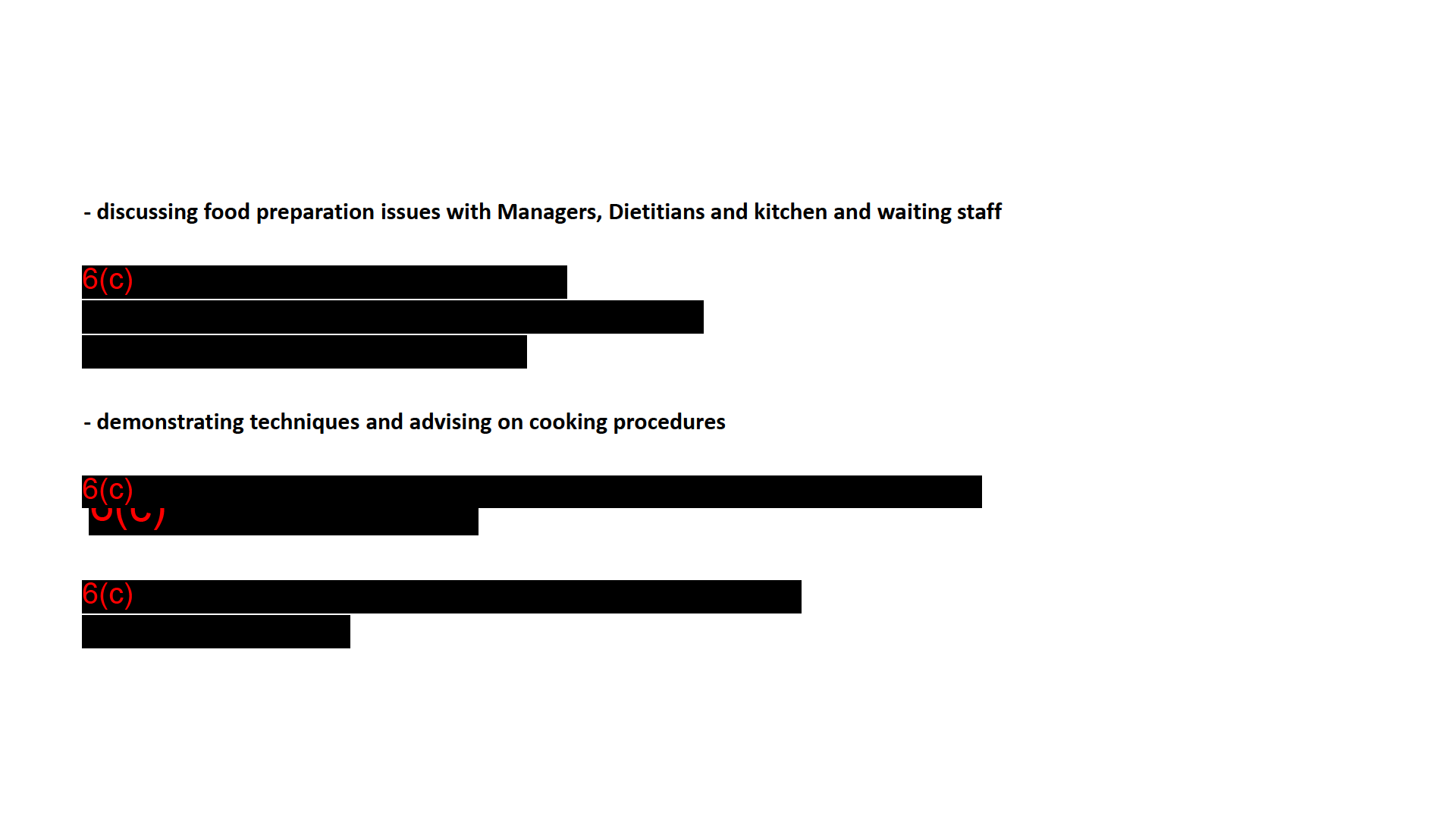
1982
Act
Information
Official
the
under
Released
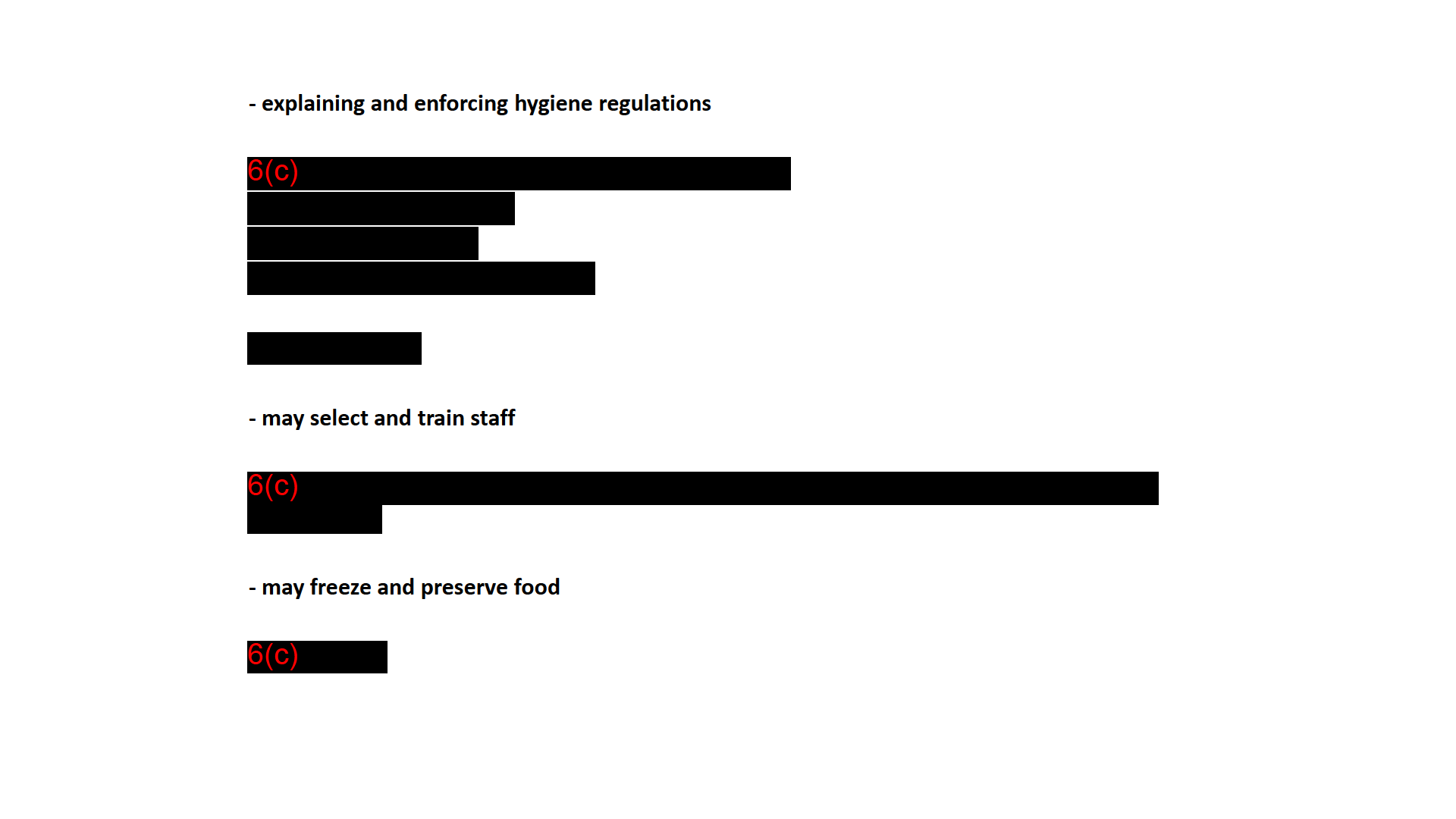
1982
Act
Information
Official
the
under
Released
 Café Chef
Establishmen
Café Chef
Establishment: Café seated 25 persons.
1982
Menu: Cooked breakfast (sausages, bacon, hash browns, eggs and toas
Act t), eggs-benedict
and light meals, including burgers, pizza, wraps, hot dogs, and toasted sandwiches
Equipment: A hot plate and pizza oven. Does not have a stove or deep fryer.
Hierarchy: Four staff members which included a manager/barista/server, a barista/server
and two cooks/servers (PA was one of them).
Information
PA’s position:
chef de partie
Reports to: Manager (owner visited once a week)
Official
Tasks: Food preparation, cooking, cleaning, serving, operating the til , stock control and
the
ordering week. Ciabatta and pizza bases were bought ready-made. Eggs-benedict was
made with ready-made sauce.
under
Released
 Café Chef (continued)
Characteristics of the employment and key learnings:
Café Chef (continued)
Characteristics of the employment and key learnings:
• The title of a position is not determinative – there is no kitchen hierarchy
• Limited range of food items typical y offered in the fast food industry
• Limited kitchen equipment
• Many of the base ingredients were purchased ready-made
• Did not appear to substantial y perform the ANZSCO tasks that set a Chef apart from a
Cook
IPT comments: Even accepting that the appel ant has been involved in menu planning,
costing (in particular for the new venture), supervising and training some kitchen staff, and
ensuring high standards for food production and health and hygiene, the Tribunal finds
that her employment does not substantial y match that of a Chef. The appel ant prepares
fast food that does not entail the finer preparation work and skil as required
under the Official Information Act 1982 for a Chef.
Further, the appel ant performs a service role in the cafe, where she operates the til and
serves customers, unlike that of a Chef who devotes time predominately to planning and
organising food preparation.
Released
IPT number: 200729
 Ethnic Chef
Establishmen
Ethnic Chef
Establishment: Thai restaurant seated 55 persons.
Menu: Had a dinner menu and takeaway menu. Dinner menu included entré
1982 e (mainly
deep fried dishes), soups, mains (curries and stir fries), ducks, seafood, rice and noodles,
Act
salad, and vegetarian options. Takeaway menu was similar but with slightly reduced items
and prices. Menu was not updated regularly but PA might create specials in order to use
the stock on hand.
Equipment: wok, pot, and deep fryer
Information
Hierarchy: Five staff members which included a training manager, an assistant manager, a
kitchen manager/waitress (owner 1), a chef (PA) and a kitchen hand (owner 2).
Tasks:
Official
Daily: cut raw meats into pieces, cook curried
the sauces, cook dishes on the menu
Every two days: cook entrée fil ings (e.g. money bags, spring rolls), toast prawns,
marinate chicken wings and chick satay
under
Once a week: cook oyster sauce, sweet and sour sauce, pad Thai sauce and special sauce
for Ped Sabai.
Responsible for stock control and ordering. The restaurant didn’t order seasonal
Released
fruit/vegetables. Fish was purchased fresh from market when on special. Satay sticks,
roasted duck, plum sauce, and some ethnic food items were ordered ready-made.
Majority seafood and meat were ordered frozen or pre-cut.
 Ethnic Chef (continued)
Ethnic Chef (continued)
1982
Characteristics of the employment and key learnings:
Act
• No kitchen hierarchy
• Items on offer did not appear to require a variety or complex cooking techniques
• Not required to demonstrate cooking techniques to junior chefs
• Many of the food items and ingredients were purchased ready
Information -made
• Limited authority in changing menu, purchasing fresh stock, costing and pricing
Official
the
Conclusion: PA’s employment was more aligned with Cook rather than Chef
under
Released
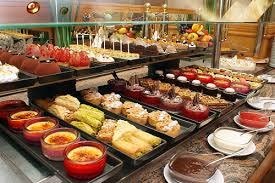 Franchise Chef
Establishmen
Franchise Chef
Establishment: Franchise restaurant offer buffet style dinning
1982
Menu: Over 100 items including hot and cold dishes, salads, seafood, m
Act eats, vegetables,
ethnic foods, soups and desserts. 80% of the menu (including recipes) was determined by
head office and 20% by franchise but required approval by head office. Franchises need
to follow policy and guidelines set by head office.
Hierarchy: There is a
chef de partie plus chefs working in the hot section
Information
PA’s position:
commis chef in the cold section
Tasks: The employer or
chef de partie ordered the majority of stock, and the
chef de
partie was responsible for controlling food costs. PA w
Official as in charge of food preparation
and presentation for the cold section, supervi
the sing and training staff, stocktaking and
ordering, delivery checking, designing menus for cold section, monitoring food cost and
labour cost accordingly, and actively participating menu design for the hotline.
under
Released
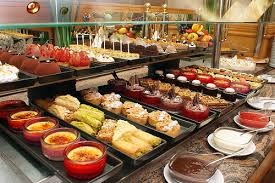 Franchise Chef (continued)
IPT comments:
Franchise Chef (continued)
IPT comments:
[48] Immigration New Zealand was correct to pinpoint the unlikely co-existence of a Chef
role in this particular franchise arrangement, and to find that the appel ant’s role did not
substantial y match the ANZSCO description and tasks for a Chef. Notably, the primary
point of distinction between a Chef and a Cook in the ANZSCO is the planning and
organisation of a Chef in the preparation and cooking of menu items. In essence, the role
was performed by the head office which designed the majority of the menu.
[50] While the appel ant contributed to estimating food costs, placed orders, monitored
the quality of dishes in the cold section, and introduced some new items on the menu,
such did not establish any substantial match with the occupation of a Chef. Any recipes
she contributed needed to be approved by the head office, and the owner was ultimately
responsible for estimating food and labour costs. Further, the appel ant’s role
under the Official Information Act 1982 in
demonstrating techniques and advising on cooking procedures and discussing food
preparation issues with managers and kitchen staff was limited, given the prescribed
menu. While it was claimed that the appel ant selected staff, no evidence of this was
Released
tendered. She was responsible for placing some orders for supplies. However, this was
subject to regulation by the head office which respect to pricing and prescribed suppliers.
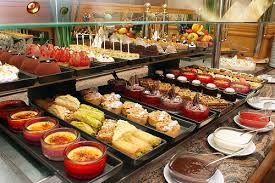 Franchise Chef (continued)
Franchise Chef (continued)
[52] The representative submits that as the appel ant’s role as a commis chef is a junior
one, certain ANZSCO tasks predominately performed by senior chefs, do not apply. The
Tribunal considered that this is not a case where it is cal ed to assess the hierarchical
nature of chef roles in respect of the ANZSCO definition. This is because of the particular
nature of the franchise, where, irrespective of any chef title an employee may carry, the
essence of the chef role (in terms of planning and organising the preparation and cooking
of items on the menu) is predetermined and set by the franchise. The appel ant did not
have the autonomy to perform these characteristic functions of a Chef and it is clear that
her role did not rise to the level of skil or responsibility of a Chef within the meaning of
the ANZSCO.
IPT number: 201427
under the Official Information Act 1982
Released
IPT Comments
• NZIPT 202119 – Commis Chef at Sudima Hotel
1982
•
“…the ANZSCO classification of a Chef has a number of distinct specialisati
Act
ons, one of which includes a commis
chef. However, the issue is not whether the appel ant’s job description label ed his as a commis chef, but whether
the tasks he actually performed in his day to day employment substantially matched those of a commis chef.
While this position may wel be junior to that of an executive chef, sous chef or chef de partie, the essential point
is that the person concerned must stil be working as a chef. In other w
Information
ords, while the fact the commis chef
position may wel be a junior one, compared to other specialisations, this does not take it outside the scope of
the ANZSCO classification of a Chef”.
Official
• “
What distinguishes a chef from a cook under ANZSC
the
O, however, is some effective responsibility for planning
menus, estimating food and labour costs, and ordering food supplies. A chef also monitors quality of dishes at all
stages of preparation and presentation and discus
under
ses food preparation issues with managers, dieticians and
others. These are not the core tasks of a cook”.
Released
IPT Comments
• NZIPT 201427 – Commis Chef at Valentines
1982
• “
The nature of the franchise restaurant was such that 80 per cent of the m
Act
enu was determined by the head
office. Al menu items needed to be approved by the head office, and the restaurant was compel ed to fol ow
policies and procedures, which were monitored by the head office. The head office issued operational updates on
product availability, suppliers and pricing.
Information
•
Immigration New Zealand was correct to pinpoint the unlikely co-existence of a Chef role in this particular
franchise arrangement, and to find that the appel ant’s role did not substantially match the ANZSCO description
and tasks for a Chef. Notably, the primary point of distinctio
Official
n between a Chef and a Cook in the ANZSCO is the
planning and organisation role of a Chef in the prepar
the
ation and cooking of menu items. In essence, this role was
performed by the head office which designed the majority of the menu”.
under
Released
IPT Comments
• NZIPT 202310 – Oceania Care Company Ltd
1982
• “
The ANZSCO description indicates that a Chef holds responsibility
Act
for organisational or oversight
functions in a restaurant kitchen. The responsibility to make decisions as to what is on the menu and
in relation to costs is what differentiates a Chef, from a Cook.
•
In this case, the appellant’s employer confirmed that the appellan
Information
t did not have any responsibility for
planning menus. This was done by a dietitian at head office who was in charge of the nationwide
menu. The appellant worked in one of the business’ 5
Official
0 retirement vil ages and rest homes which used
this menu. While the appellant was able to give
the
feedback and make suggestion about the menu,
changes needed to be approved by the dietitian. The appellant had not ability to make changes
herself”.
under
Released

If you are after a good movie about Chef’s…..
1982
Act
Information
Official
the
under
Released
















